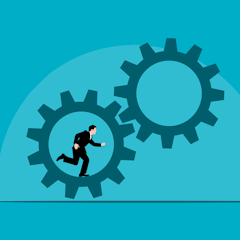
Articles on Fitness
Displaying 41 - 60 of 233 articles

The concentration of certain hormones during different phases of your menstrual cycle may give you a boost in the gym.

Changing your eating, exercising, socialising and engagement with nature can help treat depression. Now mental health professionals have some guidelines to shape treatment around lifestyle therapies.

Walking backwards burns more calories and has many other health benefits.

If you can’t lift heavy or it’s not your thing, please don’t think lifting lighter weights is a waste of time.

Be sure to include both cardio and resistance training in your workouts for the most health benefit.

The 75 Hard challenge has more than 1.2 billions views online.

Research has shown training cardio and weights on the same did has little effect on strength and muscle gain.

All event organizers should be prepared for emergencies and have a communication plan.

So-called ‘weekend warriors’ had a 30% lower risk of death from any cause compared to those who never exercised.

Three scientists explain the biology and physics of what goes into one of the world’s most grueling races, the Tour de France.

Social media content that positively represents body size, shape and weight diversity may help to address the negative psychological effects of ‘fitspiration’ that depicts narrow body standards.

I have been re-drawing my data to make visible what Strava cannot. The unheroic stuff: emotions, persistent thoughts, body sensations, lyrics from the songs, the weather.

During spring and summer, as more people consider exercising outdoors, a trauma- and violence-informed approach to physical activity can help ensure equity, inclusion, safety and access.

The Fox News host’s forthcoming documentary ‘The End of Men’ is part of a rich heritage of hustlers and politicians claiming that American men are becoming devitalized, lazy and effeminate.

Research is revealing that fitness trackers alone can be helpful facilitators toward changing a sedentary lifestyle but don’t motivate people to increase their physical activity.

Research highlights the importance of daily meditation, exercise and sleep for improving executive functioning, a component of attention that helps people focus.

There are benefits to group exercise, but relying too much on a group may leave people less resilient for solo exercise, especially if suddenly cut off from a group as many were during COVID-19.

Sore muscles after a workout isn’t really a sign you’ve worked hard.

Plyometric training isn’t only for athletes – but there are a few movements beginners will need to master if they want to try it.

When asked about postpartum exercise, women were curious about strategies and recommendations for physical activity after the birth of a child, including finding the time, energy and motivation.
